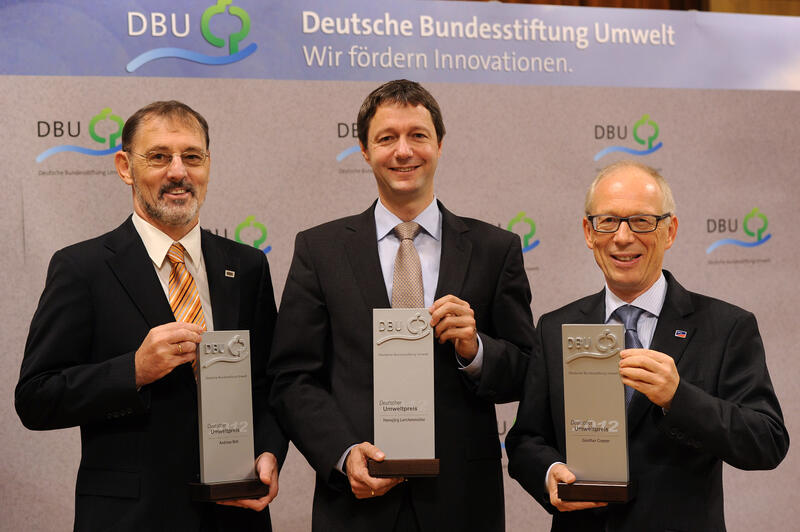German Environmental Award goes to German photovoltaic pioneers “who set new standards worldwide”
Leipzig. The German Environmental Award of the Deutsche Bundesstiftung Umwelt (DBU) has been bestowed for the 20th time. The co-founder and supervisory board chairman of SMA Solar Technology AG (Kassel), Günther Cramer (59), and the researcher-entrepreneur team Dr. Andreas Bett/Hansjörg Lerchenmüller (both Freiburg) received the award – at 500,000 euros the most lucrative environmental prize in Europe – from the hands of German President Joachim Gauck. Bett (50) is the deputy director of the Frauhofer Institute for Solar Energy Systems (ISE), while Hansjörg Lerchenmüller (45) is the CEO of Soitec Solar GmbH. The German president praised the prizewinners as exponents of something that made him proud of Germany: inventiveness and enterprise from people who were trying to transform desirable goals into practical reality. “It is not enough for us to talk big and to want more sustainability from a sense of political correctness. Sustainability must be actively desired at a political level, but implemented by business and then accepted by society.”

© Peter Himsel/DBU
Photovoltaics advanced at global level
In justifying its choice of prizewinners, the DBU said they had set new standards worldwide with their pioneering technical developments and their personal commitment to photovoltaics, and thus advanced the industry considerably at a global level. It said Cramer had succeeded in turning SMA from a small engineering consultancy into a globally active technology and market leader by focusing consistently on research and development. It described how his company had created a profile for itself with highly innovative solar inverters that change the direct current produced in photovoltaic systems into alternating current suitable for grid use.
Successful path from vision to industrial production
The DBU went on to praise Bett and Lerchenmüller as a prototype for the successful interaction between scientific excellence and business enterprise. It said they had successfully travelled the long path from vision to industrial product. With their concentrator technology; which was able to use sunlight much more effectively than conventional silicon modules by employing highly efficient multiple solar cells and special collector lenses, they had set new standards in photovoltaics, it said. According to the DBU, this technology allowed a module efficiency of around 30 percent to be achieved in practice, an energy yield that is around twice as large as when using conventional technology.
In twenty years' time, we will definitely produce electricity more cheaply than with all conventional methods
The prizewinners made it clear during the award ceremony that the path to success was a very stony one. In films shown at the presentations, Bett and Lerchenmüllter spoke about the scepticism with which their technological development was met at first, with people objecting that flat modules that could be mounted on roofs already existed. Only when they were able to put their prototypes into practical operation and demonstrate that the issue of functionality had been successfully tackled did this scepticism die away. In the end, they said, it paid off that they had stuck with their vision of using solar plants to contribute to an environmentally-friendly energy supply and employing their technology to produce energy more cheaply than previous photovoltaic technology could. Lerchenmüller: “We need a change in energy policy across the world. And we are contributing to this change directly by installing plants in North Africa with our technology and then transferring this electricity to Europe. In 20 years' time, we will definitely produce electricity more cheaply than with all conventional methods, with a module efficiency of more than 40 percent.”
“Let us be realists and attempt the impossible”
In his film, Cramer also spoke about his pioneering work, which “is absolutely the best thing anyone can do”. Having been influenced by the controversy surrounding nuclear energy, he said, he had come to the clear opinion that a risk-free energy supply was necessary for both humans and the environment. He describe how, as an enthusiastic engineer driven by the motto “let us be realists and attempt the impossible”, he devoted himself to the development of new energy supply systems. Cramer: “No one back then really dared yet to change from conventional to renewable. We wanted to demonstrate that it is possible and wanted it to be copied by our colleagues in the industry.” In this way, he said, it had been possible to considerably increase the efficiency of inverters, despite all setbacks.
Energetic stand-alone systems “precondition for people to leave their poverty spiral”
Cramer went on to say that it was important for the future to create energetic stand-alone solutions that could supply those 1.3 billion people with electrical energy who at present have no access to electricity and water. He said that the technology he used in his own SMA buildings served as a model, and could also be employed in remote areas. Cramer: “In future I would like to concentrate on installing these systems to operate in these remote regions. That is much more complicated than anything we have so far done with the technology. But I am sure that we will achieve it. For that is the precondition for these people to be able to get out of their poverty spiral.”